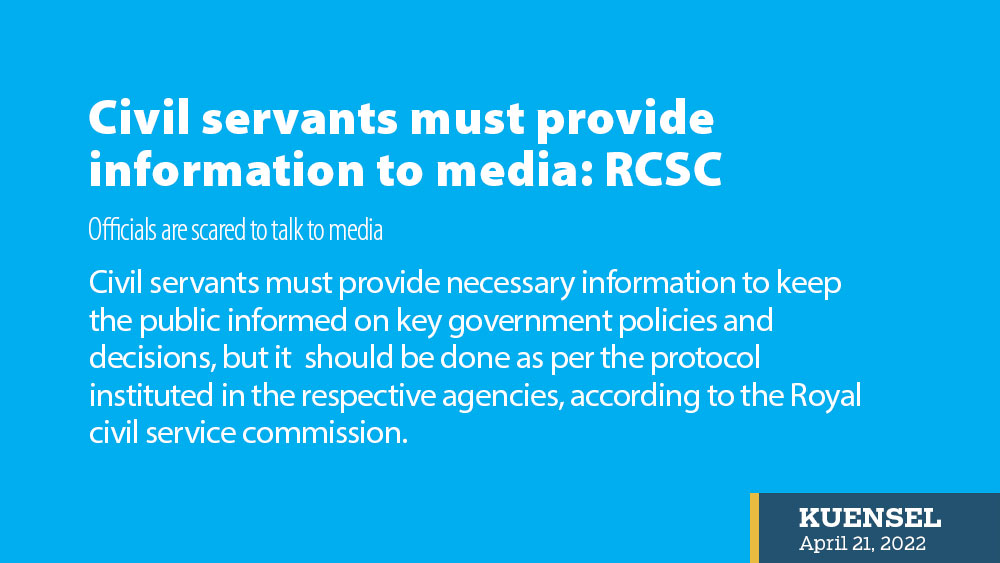Officials are scared to talk to media
Nima Wangdi
Civil servants must provide necessary information to keep the public informed on key government policies and decisions, but it should be done as per the protocol instituted in the respective agencies, according to the Royal civil service commission (RCSC).
Clarifying on the confusions and misunderstandings surrounding civil servants talking to the media, RCSC officials said the protocols are in place to ensure dissemination of correct and factual information in the public domain.
In an-email interview, RCSC’s media focal person mentioned that it was a common practice that any agency, both public and private, expect their staff to abide by its code of conduct. “This is particularly critical for the civil servants as they represent the government,” the e-mail response from the RCSC media focal person.
The email stated that the code of conduct and values reflected in the Bhutan Civil Service Rules and Regulations (BCSR), 2018 is to ensure integrity, discipline, accountability and effectiveness of the civil servants, which has been diminishing in recent years leading to systemic weakening of the civil service.
Section 3 of the BCSR is on civil service values and conduct.
Clause 3.3.16.1 states that a civil servant shall maintain the integrity of the position he is holding, always support the government in furthering its policies and programmes, give all his expertise and feedback including grievances in-house or to relevant authority implementing the policies and provide required information necessary to keep the public informed on key government policies and decision as per established protocol of the respective agencies for sharing information with the media and public.
Clause 3.3.16.2 restricts civil servants from criticising or undermining government policies, programmes and actions in public and or through media (broadcast, print and online). It also restricts civil servants from communicating, transmitting or posting hate messages or any content with the intent to defame a person or government agencies.
BCSR misinterpreted?
Following the agriculture ministry compulsorily retiring two foresters for breaching section 3.3.16.2 of the BCSR, some civil servants are avoiding the media even if it is sharing “necessary information to keep the public informed” and not against the agency.
A senior official working for an authority in Thimphu recently agreed to share information after this paper consented to not even mention the source of the information as an official from the authority. “The RCSC is tightening the law. We can never predict the consequences of talking to the media,” he said when Kuensel requested for information.
The official was quoted frequently in the recent past, but he is now uncomfortable crediting the information to his name. He cited the example of the two female foresters who were compulsorily retired. An agriculture extension officer denied sharing data related to agriculture produce in the gewog soon after the notification. The officer first agreed to share refused to do so citing the same example – the two foresters.
A reporter, working for a private newspaper said the whole procedure of civil servants sharing information with the media has now changed after the recent incident. “My sources are not open like they used to be. It takes a long time to get information while seeking permissions from heads of the agencies and ministries.”
The Jigme Dorji Wangchuck National Referral Hospital issued notifications cautioning civil servants on sharing information to the media without following the due process. However, the civil servants took it otherwise and refrained from talking to media.
Many in the media said that getting information has become difficult after the recent incidents.
An academic writer and a lawyer, Sonam Tshering, in a recent perspective stated that the recent action of compulsory retiring two foresters for merely speaking to media and the ministry issuing notice barring employees from expressing in media shows the desperation and extend to which public authorities use indirect methods to either silence or suppress open public criticism.
Talking to Kuensel, Sonam Tshering said RCSC has framed rules prohibiting the civil servants from expressing any opinion in the public forum. He said that lawyers on the government side will contest it to be reasonable whilelawyers outside the civil service or on the other side would say it is unreasonable. “However, the judiciary can only test its reasonableness.”
The RCSC’s legal officer could not be consulted on the BCSR 2018 as he could not be reached. The media officer is on medical leave and couldn’t arrange a face to face interview with the legal expert after Kuensel tried for four days.


